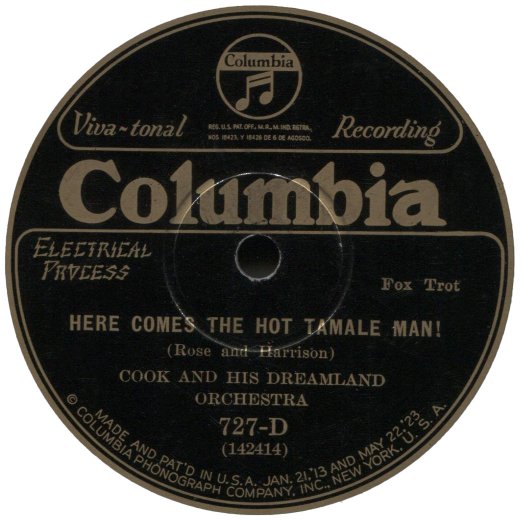
“Spanish Mamma”
Cook and His Dreamland Orchestra
(Columbia 727-D mx 142417) July 10, 1926
“Here Comes The Hot Tamale Man”
Cook and His Dreamland Orchestra
(Columbia 727-D mx 142414) July 10, 1926
From the Edward Mitchell collection, here are two recordings of an all-black jazz band based out of Chicago that I think are outstanding. “Spanish Mamma” is my favorite of the two because the tune is so wonderfully happy and catchy, but “Here Comes The Hot Tamale Man” is also excellent.
The band, led by Charles L. Cooke also made recordings under the name of Doc Cook and his 14 Doctors of Syncopation. A smaller sub-unit of the band made recordings under the name of Cookie’s Gingersnaps.
Dreamland refers to Paddy Harmon’s Dreamland Ballroom in Chicago, where the band had an extended engagement at the time of this recording session.
“Doc” was not just an empty nickname – Cooke had a doctoral degree in music from the Chicago College of Music and was one of the first black Americans to receive a doctorate in music.
Less than a month before these sides were recorded, a subset of the band recorded “Here Comes The Hot Tamale Man” for the OKeh label under the name of Cookie’s Gingersnaps. Unlike the Columbia recording here, which was made electrically, the OKeh version was recorded using the old pre-microphone acoustical technology.
At that time, OKeh was using its own homegrown “Truetone” electrical recording process to avoid the high cost of licensing the Western Electric technology used by Victor and Columbia. But the quality of those electrical recordings was so spotty that OKeh continued to use the old acoustical process for some of its recording sessions and even went so far as to rerecord acoustically certain sides that had previously been recorded electrically but were deemed to be of insufficient quality to release.
You can hear the acoustically recorded Okeh version of “Here Comes The Hot Tamale Man” on YouTube at this link.
OKeh’s electrical recording woes were solved in November 1926 when the label was purchased by Columbia which, until the Great Depression brought the record industry to its knees, allowed OKeh to operate as an independent subsidiary. This gave OKeh access to the same Western Electric process that Columbia used. In my opinion, the quality of the electrical recordings made by Columbia and OKeh once it was under Columbia’s ownership is usually superior to that of all other labels – especially when combined with the super-quiet laminated surface on Columbia pressings that, in part, explains why the two recordings here sound so great.
Cooke moved to New York City in 1930, where he worked as an arranger for Radio City Music Hall and RKO Pictures. He also provided arrangements for several Broadway productions into the 1950s, even after he was partially paralyzed by a stroke.
